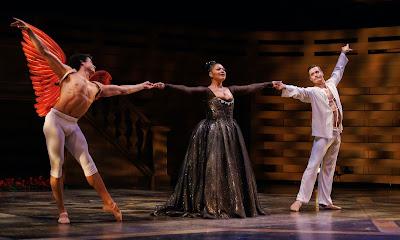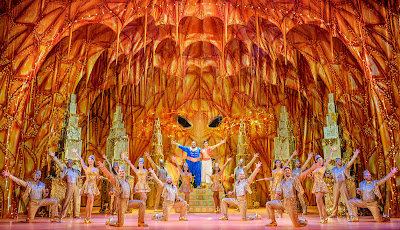Reviewed by James
Karas
Rosencrantz and Guildenstern, as anyone who has seen Hamlet
knows, are two non-entities in Shakespeare’s play and the title of Tom
Stoppard’s play is a line from that play. Despite the title, Stoppard has given
the two friends more life on the stage and on film than the two fictional
characters could ever have imagined.
Rosencrantz and Guildenstern have been invited to Elsinore by King
Claudius to figure out why Prince Hamlet is acting strangely. Eventually they are sent to England with Hamlet to
deliver a letter to the English King telling him to
kill Hamlet. Hamlet discovers the letter and changes it to read that Rosencrantz
and Guildenstern are to be executed.
Shakespeare has some fun with the duo but Tom Stoppard has created a
funny, complex and wonderful play around the dumb pair. Nova Scotia’s Neptune Theatre
has landed two superb actors to play the lead roles and David Mirvish has
brought the production to Toronto at the CAA Theatre.
The Neptune production has thirteen actors but it can be done with many
more. The main characters of Shakespeare’s play appear but Rosencrantz and
Guildenstern dominate the play. In that regard Director Jeremy Webb has the
fortune of having Dominic Monaghan and Billy Boyd, two outstanding actors in
the lead roles. Webb delivers a superb production that brings out the comedy
and the complexity of the play with a light touch.
Photo Credit: @stoometzphoto
The opening scene sets the stage and the comic and intellectual level of
the play superbly. Monaghan’s Rosencrantz and Boyd’s Guildenstern are playing
what appears to be a mindless game. They flip coins. Rosencrantz calls ‘heads”
and he wins consistently. This goes on for some ninety tosses and the coin
never lands on “tails.” Have the laws of probability ceased to apply?
Guildenstern wonders. They may wonder about philosophical issues but they don’t
know where they are nor where they are going.
Aha! They received an invitation to go to Elsinore where Hamlet (Pasha
Ebrahimi), their university friend in Germany has returned because his father
has been killed and his mother Gertrude has married his uncle King Claudius who
has usurped the throne.
They meet a troupe of actors known as the Tragedians who are headed for
Elsinore. They are headed by one called The Player (a feisty, quick-witted and
agile Michael Blake).
At Elsinore they meet King Claudius (Jonathan Ellul) and Gertrude (Raquel
Duffy) who mistake the identity of their guests. Rosencrantz and Guildenstern have to correct
her as to who they are and they seem to be so lightheaded at times one wonders
if they can tell who between themselves is who. Very funny and well done by Monaghan
and Boyd.
Claudius explains to them that they must find out what is wrong with Hamlet
and the two engage in a question-and-answer game as a possible approach to
Hamlet. They confuse themselves thoroughly and have no way of finding out what
is bothering their friend.
Photo Credit: @stoometzphoto
The two are inept at everything and they find out that they have been
selected to take Hamlet to England and deliver a letter to the King. They
converse about death, suicide and the representation of death (theirs) on
stage. In their confused state of mind, they eventually find out who is carrying
the letter to the King of England and open it. They don’t know where they are,
wonder if they are dead and question how they will deliver it to the king.
As the play ends, the Ambassador (Mallory Amirault) announces that Rosencrantz
and Guildenstern are dead and as Horatio (Santiago Guzman) speaks, the lights
go down to end the play. But Webb is not prepared to leave matters there. Rosencrantz
and Guildenstern pop back on stage where they started. Nice touch.
The play depends on the cleverness and comic talent of Stoppard but its
delivery depends on Webb and the cast especially Monaghan and Boyd. They prove
that they are masters of repartee and the presentation of the two characters who
may be dumb but are also complex. They handle the dialogue with splendid speed,
expressiveness and humour as necessary. The rest of the cast do fine work but
compared to the leads have relatively smaller roles.
Set Designer Andrew Cull uses two sets of rows of seats theatre-style
that can be turned around and pushed off to the sides. There is an indication
of a ship and they serve as the sets for the play. Economical and adequate.
This is a verbal play and requires very little in the way of sets.
We get an intelligent and redoubtable production of a marvelous play.
__________________________________________
Rosencrantz and
Guildenstern Are Dead by Tom
Stoppard, in a production by Neptune Theatre, directed by Jeremy Webb continues until April 6, 2024, at
the CAA Theatre, 651 Yonge St. Toronto, Ontario. www.mirvish.com/
James Karas is the Senior Editor, Culture of The Greek press











%20-%202024%20Tarragon.jpg)





